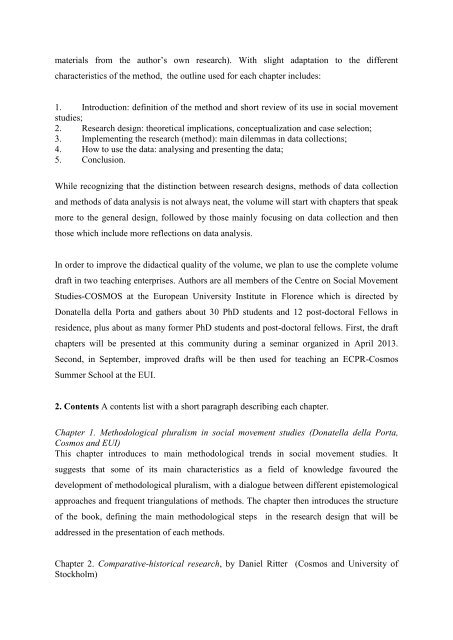Methodological Practices in Social Movements Research
Methodological Practices in Social Movements Research
Methodological Practices in Social Movements Research
You also want an ePaper? Increase the reach of your titles
YUMPU automatically turns print PDFs into web optimized ePapers that Google loves.
materials from the author’s own research). With slight adaptation to the different<br />
characteristics of the method, the outl<strong>in</strong>e used for each chapter <strong>in</strong>cludes:<br />
1. Introduction: def<strong>in</strong>ition of the method and short review of its use <strong>in</strong> social movement<br />
studies;<br />
2. <strong>Research</strong> design: theoretical implications, conceptualization and case selection;<br />
3. Implement<strong>in</strong>g the research (method): ma<strong>in</strong> dilemmas <strong>in</strong> data collections;<br />
4. How to use the data: analys<strong>in</strong>g and present<strong>in</strong>g the data;<br />
5. Conclusion.<br />
While recogniz<strong>in</strong>g that the dist<strong>in</strong>ction between research designs, methods of data collection<br />
and methods of data analysis is not always neat, the volume will start with chapters that speak<br />
more to the general design, followed by those ma<strong>in</strong>ly focus<strong>in</strong>g on data collection and then<br />
those which <strong>in</strong>clude more reflections on data analysis.<br />
In order to improve the didactical quality of the volume, we plan to use the complete volume<br />
draft <strong>in</strong> two teach<strong>in</strong>g enterprises. Authors are all members of the Centre on <strong>Social</strong> Movement<br />
Studies-COSMOS at the European University Institute <strong>in</strong> Florence which is directed by<br />
Donatella della Porta and gathers about 30 PhD students and 12 post-doctoral Fellows <strong>in</strong><br />
residence, plus about as many former PhD students and post-doctoral fellows. First, the draft<br />
chapters will be presented at this community dur<strong>in</strong>g a sem<strong>in</strong>ar organized <strong>in</strong> April 2013.<br />
Second, <strong>in</strong> September, improved drafts will be then used for teach<strong>in</strong>g an ECPR-Cosmos<br />
Summer School at the EUI.<br />
2. Contents A contents list with a short paragraph describ<strong>in</strong>g each chapter.<br />
Chapter 1. <strong>Methodological</strong> pluralism <strong>in</strong> social movement studies (Donatella della Porta,<br />
Cosmos and EUI)<br />
This chapter <strong>in</strong>troduces to ma<strong>in</strong> methodological trends <strong>in</strong> social movement studies. It<br />
suggests that some of its ma<strong>in</strong> characteristics as a field of knowledge favoured the<br />
development of methodological pluralism, with a dialogue between different epistemological<br />
approaches and frequent triangulations of methods. The chapter then <strong>in</strong>troduces the structure<br />
of the book, def<strong>in</strong><strong>in</strong>g the ma<strong>in</strong> methodological steps <strong>in</strong> the research design that will be<br />
addressed <strong>in</strong> the presentation of each methods.<br />
Chapter 2. Comparative-historical research, by Daniel Ritter (Cosmos and University of<br />
Stockholm)

















